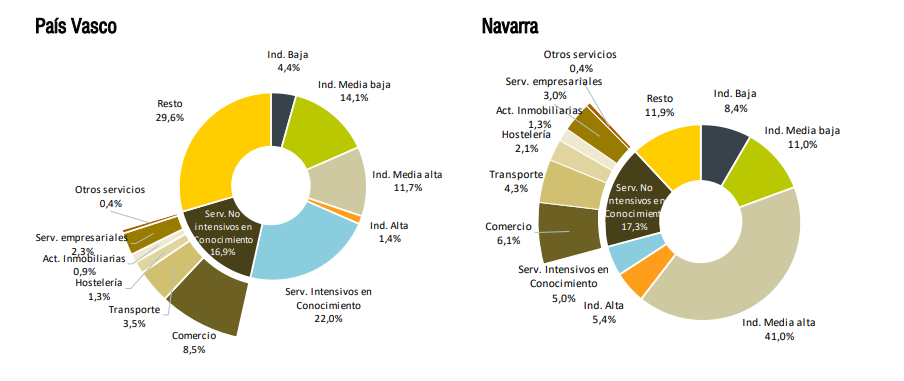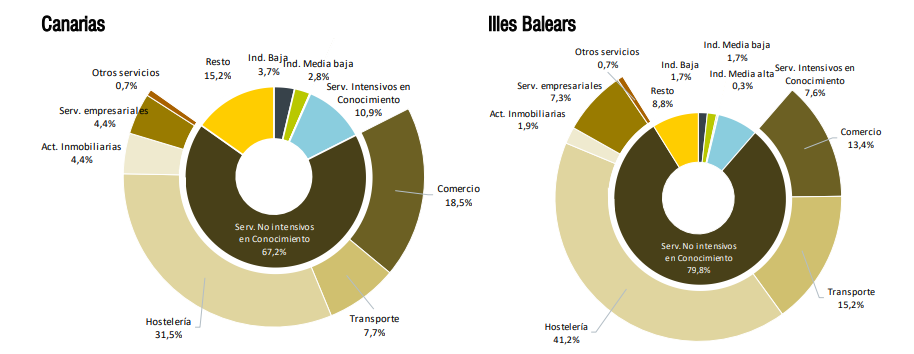
The Chair of Family Business of the University of Valencia in collaboration with the Observatory on Government, Strategy and Competitiveness (GECE) present a new GECE Report under the title "Which autonomous communities are best positioned to face the economic valley of Covid-19?" promoted by Bankia and the Valencian Institute of Economic Research (IVIE), where the capacity of the Spanish regions to resist the economic crisis generated by the coronavirus is analyzed and compared.
The Valencian Community is strongly conditioned by a deficit of highly competitive companies. It has 1.7% fewer companies considered highly competitive than the national average, a gap that shows no trace of going back. The region's highly competitive enterprises are also heavily concentrated in the trade sector, one of the most affected by the restrictions imposed on Covid19. Nor does it highlight the presence of highly competitive companies from Valencia, Alicante and Castellón in intensive sectors of technology and knowledge.
"The crisis caused by covid-19 poses a great challenge that has highlighted the strengths and weaknesses of companies in each region"
Alejandro Escribá, researcher at Ivie and professor at the University of Valencia.
In addition, the weight of the wealth generated and the employment produced by these companies, which are the most resilient to difficult economic situations, has fallen by 3 percentage points in the last five years nationally, but in the Valencian Community this decline has been much steeper, with 7.4 points less in value added and 5.5 points less in employment.
"In the case of the Valencian economy, the relative scarcity of highly competitive companies, the strong weight of trade (compensated in part by the strength of agri-food trade), low technological and knowledge intensity, and insufficient business size are outstanding subjects. These weaknesses have endured for years, and this crisis is a new opportunity to deal with a change of sectoral model and to bet on business growth," Alejandro Escribá said.
The report shows that the autonomous communities with the highest percentage of companies with high levels of competitiveness and which also have a diversified business fabric and companies of greater size and technological intensity are the ones that can best respond to the Covid-19 crisis. In Spain, seven regions are above average in terms of percentage of highly competitive companies. The Canary Islands stands out, with 11.3% more competitive firms, followed by Navarra, the Balearic Islands, the Basque Country, La Rioja, Catalonia and Madrid.

In the whole of Spain, Navarra and the Basque Country are the communities located in a favorable position to deal with the current situation, since, on the one hand, they are among the regions with the highest percentage of highly competitive companies (8.3% and 5.9% above average, respectively), and on the other hand, these highly competitive companies have a diversified sectoral specialization, with strong weight of technology and knowledge.

At an intermediate point to deal with the crisis are Madrid and Catalonia, with global levels of business competitiveness slightly above average. In addition, its most competitive companies also belong to high intensity sectors in knowledge or industries of high technological intensity.

In contrast, the Canary Islands and the Balearic Islands stand out for having a percentage of companies classified as highly competitive well above average (11.3% and 7.2% more, respectively). However, these companies are strongly concentrated in the tourism sector, with hospitality as the main generator of added value. This specialization places them in a more fragile position in the face of mobility restrictions and activity constraints imposed by the pandemic.

In this case, the short-term impact of covid-19 will be more intense, but if the crisis does not lengthen excessively, many companies are well positioned to resist and recover their activity when the health alarm is resolved.
See the GECE 1/2021 report here
See the above GECE keys or reports here
Go to the GECE Observatory website here
___________________________________________________________
You can check the news published by:
- El Mundo: El peso del comercio y la baja intensidad tecnológica de la industria limitan la respuesta de la economía ante la Covid
- El Temps: La vacuna de la competitivitat
- Bankia: El fuerte peso del comercio y la baja intensidad tecnológica de la industria limitan la respuesta de la economía valenciana ante la Covid-19
- Valencia Plaza: Menor competitividad e intensidad tecnológica lastran la respuesta de la Comunitat a la crisis, según el Ivie
- La Vanguardia: El peso del comercio y la baja intensidad tecnológica limitan a las empresas valencianas








